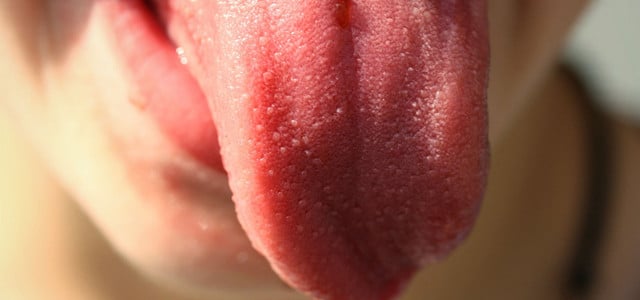
Eating, singing, kissing: it’s less fun when your tongue or even your whole mouth is burning. This often affects women going through the menopause – but not only them. What can alleviate the annoying symptoms.
It burns, tingles, hurts: If the tongue draws attention to itself like this for several hours a day, it is hard to think of anything else. Doctors call this burning sensation of the tongue glossodynia.
The front two thirds of the tongue are usually affected, its edges and its tip, explains the ProDente initiative. Sometimes the symptoms also spread to the palate, cheeks and oral mucosa. This is then referred to as burning mouth syndrome.
Often it is not just a burning sensation: it is possible that the perception of tastes also changes. Or that you constantly have an unpleasant metallic or bitter taste on your tongue, according to ProDente. Dry mouth and increased bad breath can also accompany the burning tongue.
These can be causes of burning tongue
Middle-aged and older women are particularly affected. According to ProDente, it is estimated that around one in six women experience these symptoms during and after menopause. One possible explanation: the hormonal changes and the psychological stress of menopause promote burning of the tongue.
But the symptoms can have many possible causes. It could also be the sharp edges of the dentures that irritate the mucous membranes. A burning tongue can also be caused by a congenital dysfunction of the salivary glands – or by a fungal infection, a herpes infection or certain medications. Mental illnesses such as depression or schizophrenia can also cause burning tongues.
The burning sensation can also indicate that the body is lacking important vitamins or trace elements – for example vitamin B12, vitamin C, folic acid or iron. Or that you are allergic to an ingredient in your toothpaste or mouthwash.
Where those affected can get help
Precisely because there are so many possible causes behind burning tongue, it makes sense to first visit your GP, as ProDente recommends. The reason: your GP knows your medical history best, has an overview of underlying diseases, prescribed medications and allergies. This may give you a suspicion as to what the cause could be – and how it can possibly be treated.
In the next step, the burning tongue can be further clarified – for example by specialists in the fields of dentistry, psychosomatics, otolaryngology or dermatology.
What those affected can do themselves
If your mouth burns regularly, you should avoid anything that further irritates the mucous membranes in your mouth. In addition to spicy and acidic foods, this also includes alcohol and nicotine, according to ProDente.
Mouthwashes can be soothing – provided they are mild varieties, such as those with sage or chamomile. If your mouth is dry, you should make sure you drink plenty of fluids. Sugar-free chewing gum can also help counteract dryness, as chewing stimulates saliva production.
Precisely because the psyche often plays a role in burning tongue, it is worth finding a healthy way to deal with stress and psychological strain – even if that is often easier said than done.
Read more on Techzle\.com:
- Coated tongue: These home remedies help with a white tongue
- Bad breath: causes and remedies for bad breath
- Flavors: How your tongue helps you eat healthily
** marked with ** or orange underlined Links to sources are sometimes affiliate links: If you buy here, you are actively supporting Techzle\.com, because we then receive a small part of the sales proceeds. More information.